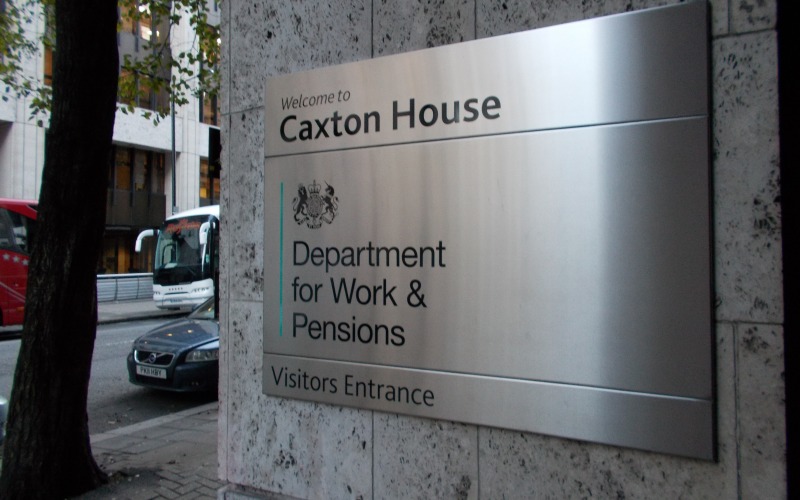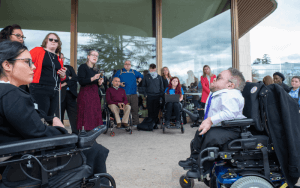A new business that charges benefit claimants £100 to record their disability assessments has been accused of exploiting disabled people’s fears about social security reforms.
Disability News Service (DNS) was contacted this week by the Liverpool-based business, which says it provides “professional” recordings of face-to-face assessments.
In its marketing material it offers to record “PIP and work capability assessments” as well as “DLA and ESA assessments” and warns disabled people not to risk undergoing their assessments without recording them, and not to trust the Department for Work and Pensions (DWP).
Former sound technician Alan Davies, who runs The Truth Recordings, denies exploiting disabled benefit claimants, and has told DNS that he is just offering a service and that people are under no obligation to use his service.
He said: “It’s easy to point the finger. Do I want to make a living from it? Yes, I do. I’m not going to do it for free.
“If you had a plumber coming to fix your pipes: £80 call out. You can say, ‘what’s that about?’ but whether you’re able or disabled, that’s the price.
“We could all pull a face about it but that’s the price and that guy is making a living and that’s how I’m making a living, and the world turns.
“We could all pick holes in everything, couldn’t we, if that service is there and you have got to pay for it and you don’t like it…”
He told DNS he charges £100 per booking for a morning or afternoon slot, which includes his time spent setting up the equipment, waiting for the assessment to be completed, and packing up the equipment and producing the recordings at the end.
Davies says an assessment can last 90 minutes, so a single job can take as long as three hours.
He says the idea for the business came because of a disabled relative who had a “bad experience” at a personal independence payment (PIP) assessment.
He has recently been spreading the word about his new service to local solicitors, Citizens Advice and “Disability Services”.
He told DNS yesterday that providing a recording was a “game changer” for claimants and that assessment providers ensure they have “the best man on the job” if they know an assessment is going to be recorded.
He has three second-hand NEAL 5000 recorders, which he says can each provide two identical copies of a recording of an assessment, as required by DWP.
He said: “I understand £100 is a lot of money but also it is someone’s time. I have got to pay wages.
“I’m not cashing in on somebody else’s problem but it is their problem and it is a service and I have to pay for my time, or somebody else’s time, and I have to pay for travelling.”
Davies says the number of assessments he and a colleague who works for him have recorded so far is “in the 20s” over the seven or eight months they have been offering the service in the Liverpool area.
Most of them, he claims, have been commissioned by solicitors acting for claimants who have had bad experiences in the past with their assessments.
But disabled activists have pointed out that the Labour MP for Liverpool Walton, Dan Carden, has bought recording equipment of his own so that disabled people can borrow it free of charge to record their PIP assessments*.
In October, grassroots activists from Disabled People Against Cuts Sheffield (DPAC Sheffield) responded to the government’s continuing failure to deal with the dishonesty and inaccuracy of the PIP process by launching a scheme to help more disabled people record their own assessments.
The scheme saw DPAC Sheffield launch a fundraising campaign to pay for recording kits at £105 a time – which has so far raised more than £900 – so other organisations can lend them to disabled people without charge to record their PIP assessment to the necessary technical specifications demanded by DWP.
The grassroots groups Recovery In The Bin and national DPAC are also building a map of locations where equipment is available, including the kit being loaned out by DPAC Sheffield.
The business start-up in Liverpool appears to be an attempt to profit from these efforts and disabled people’s concerns about the honesty of the healthcare professionals carrying out assessments for government contractors Atos, Capita and Maximus.
Manchester Disabled People Against Cuts (MDPAC), which was the first grassroots group to provide recording kits free of charge, three years ago, said it was “appalled at this exploitative profiteering” by The Truth Recordings.
An MDPAC spokesperson said: “For £100, people can make their own kit and then help others.
“The disabled people’s movement is built on solidarity, supporting each other.
“Those seeking to profit from DWP, Atos, Capita, and Maximus abuse cannot be considered part of our movement.
“We advise people to create their own recording kits and notify us so they can be listed on the website so others may borrow it, for free.”
A DPAC Sheffield spokesperson added: “DPAC Sheffield are outraged and disgusted by news that a so-called ‘new start up business’ in Liverpool is cynically charging claimants £100 a time to use recording kit which is already available for free in the city!
“We will fight such cynical and disgraceful exploitation of disabled people’s fears.”
The spokesperson added: “It’s not about ‘doing it for free’, it’s about showing support and solidarity to each other at a time of need.
“We’re proud to have campaigned on this project with MDPAC and to ensure that disabled people facing the harrowing PIP process are as well supported as possible without being charged a single penny wherever our ‘On The Record’ kits are in place.
“New locations are being added each week at the moment so there’s really no need to take money off people. We absolutely cannot condone anyone doing that.”
A DWP spokesperson said: “People applying for employment and support allowance (ESA) or the sickness component of universal credit (UC) can request that their assessment is recorded.
“PIP assessments can also be audio recorded, with equipment provided by the claimant, however claimants should inform the assessment provider in advance that they wish to do so.”
DWP is still considering the findings of a trial of video-recording PIP assessments as well as other options for how best to improve “trust and transparency”.
Acceptable formats for recording PIP assessments include CD and audio cassette, but they must produce two simultaneous copies of the assessment, says DWP.
DWP says it does not carry out face-to-face assessments for disability living allowance (DLA).
DNS spent months investigating allegations of dishonesty by PIP assessors in late 2016 and throughout 2017, hearing eventually from more than 250 disabled people in less than a year about how they had been unfairly deprived of their benefits.
These reports of dishonesty have persuaded many claimants that they should record their face-to-face assessments, but the government has refused so far to fulfil its pledge to make recording PIP assessments “a standard part of the process”.
It continues to hear from disabled people who describe how healthcare professionals lied about what they had been told when writing assessment reports.
*Anyone who would like to borrow Dan Carden’s recording equipment for a PIP assessment can contact his office in Liverpool, via email at [email protected] or by phoning 0151 284 1160
A note from the editor:
Please consider making a voluntary financial contribution to support the work of DNS and allow it to continue producing independent, carefully-researched news stories that focus on the lives and rights of disabled people and their user-led organisations.
Please do not contribute if you cannot afford to do so, and please note that DNS is not a charity. It is run and owned by disabled journalist John Pring and has been from its launch in April 2009.
Thank you for anything you can do to support the work of DNS…

 UN’s ‘damning verdict’ is ‘vindication’ of fightback against government’s rights violations
UN’s ‘damning verdict’ is ‘vindication’ of fightback against government’s rights violations Sunak’s ‘chilling, threatening’ speech on benefits ‘demonised disabled people’
Sunak’s ‘chilling, threatening’ speech on benefits ‘demonised disabled people’ Direct action ‘will put stake through the heart’ of government scapegoating of disabled people
Direct action ‘will put stake through the heart’ of government scapegoating of disabled people